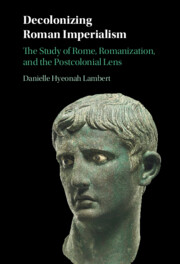Book contents
- Decolonizing Roman Imperialism
- Decolonizing Roman Imperialism
- Copyright page
- Dedication
- Contents
- Acknowledgements
- Introduction
- Chapter 1 The Discourse on Romanization in the Age of Empires
- Chapter 2 Postcolonial Themes
- Chapter 3 Postcolonial Questions in the Age of Decolonization
- Chapter 4 Towards a Paradigm Shift in the Age of Globalization
- Historical Intervention
- References
- Index
Introduction
Published online by Cambridge University Press: 03 October 2024
- Decolonizing Roman Imperialism
- Decolonizing Roman Imperialism
- Copyright page
- Dedication
- Contents
- Acknowledgements
- Introduction
- Chapter 1 The Discourse on Romanization in the Age of Empires
- Chapter 2 Postcolonial Themes
- Chapter 3 Postcolonial Questions in the Age of Decolonization
- Chapter 4 Towards a Paradigm Shift in the Age of Globalization
- Historical Intervention
- References
- Index
Summary
The framework of ‘Romanization’ developed by Haverfield in 1905 - that Romans ‘civilized’ their imperial subjects, particularly those in ‘barbarian’ western provinces - remains hegemonic, notwithstanding multiple revisionist attempts. It has been reasserted, rejected, or modified, but still frames the debate. Yet, the postcolonial project to decolonize the production of historical knowledge has prompted some scholars to seek fresh approaches and to rewrite the history of Roman imperialism. This book asks: what is the value of postcolonialism in the discourse on Romanization? How has it influenced the discourse on Romanization thus far? Can postcolonialism move the discourse on Romanization forward? Borrowing Said’s concept of travelling ideas, this book undertakes a comparative study between the point of departure and the point(s) of arrival of travelling ideas of postcolonialism to understand their path and impact in the discourse on Roman imperialism and Romanization.
Keywords
Information
- Type
- Chapter
- Information
- Decolonizing Roman ImperialismThe Study of Rome, Romanization, and the Postcolonial Lens, pp. 1 - 14Publisher: Cambridge University PressPrint publication year: 2024
